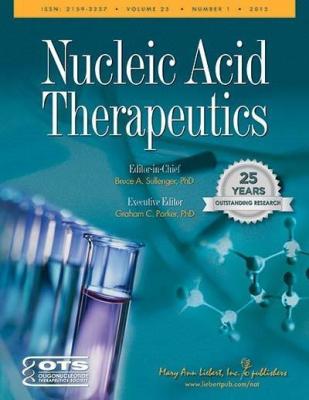Jan 28 2015
Therapeutic oligonucleotide analogs represent a new and promising family of drugs that act on nucleic acid targets such as RNA or DNA; however, their effectiveness has been limited due to difficulty crossing the cell membrane.
A new delivery approach based on cell-penetrating peptide nanoparticles can efficiently transport charge-neutral oligonucleotide analogs into cells, as reported in Nucleic Acid Therapeutics, a peer-reviewed journal from Mary Ann Liebert, Inc., publishers. The article is available free on the Nucleic Acid Therapeutics website.
 Nucleic Acid Therapeutics is an authoritative, peer-reviewed journal published bimonthly in print and online that focuses on cutting-edge basic research, therapeutic applications, and drug development using nucleic acids or related compounds to alter gene expression. Nucleic Acid Therapeutics is the official journal of the Oligonucleotide Therapeutics Society. Complete tables of content and a sample issue may be viewed on the Nucleic Acid Therapeutics website. Credit:©Mary Ann Liebert, Inc., publishers
Nucleic Acid Therapeutics is an authoritative, peer-reviewed journal published bimonthly in print and online that focuses on cutting-edge basic research, therapeutic applications, and drug development using nucleic acids or related compounds to alter gene expression. Nucleic Acid Therapeutics is the official journal of the Oligonucleotide Therapeutics Society. Complete tables of content and a sample issue may be viewed on the Nucleic Acid Therapeutics website. Credit:©Mary Ann Liebert, Inc., publishers
In the article, "Peptide Nanoparticle Delivery of Charge-Neutral Splice-Switching Morpholino Oligonucleotides," Peter Järver and coauthors, Cambridge Biomedical Campus (U.K.), Karolinska University Hospital (Huddinge, Sweden), Stockholm University (Sweden), Alexandria University (Egypt), and University of Oxford (U.K.), note that while delivery systems exist to facilitate cell entry of negatively charged oligonucleotide drugs, these approaches are not effective for charge-neutral oligonucleotide analogs. The authors describe lipid-functionalized peptides that form a complex with charge-neutral morpholino oligonucleotides, enabling them to cross into cells and retain their biological activity.
"The exploitation of phosphorodiamidate morpholinos represents an exciting approach to treating a number of therapeutic targets," says Executive Editor Graham C. Parker, PhD, The Carman and Ann Adams Department of Pediatrics, Wayne State University School of Medicine, Children's Hospital of Michigan, Detroit, MI. "This paper suggests an intriguing but practical approach to solving the lack of a convenient non-covalent delivery system."